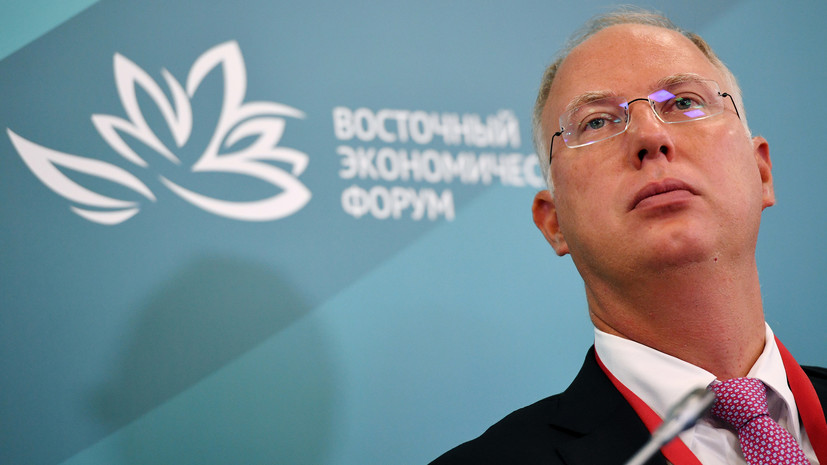- Kirill Alexandrovich, on the sidelines of the WEF you spoke about the partnership of RDIF with investors from China. Moreover, back in June, it was decided to create a $ 1 billion Russian-Chinese scientific and technological innovation fund. Why are the Chinese today interested in cooperation with Russia in the field of technology?
- Russia and China can develop a number of technologies together. It is about cooperation, for example, in genetics or artificial intelligence. The fund will allow the creation of companies that would work not only in Russia and China, but also on the international market.
Today we invest in Chinese companies that work in the field of artificial intelligence, we are also an investor in one of the largest transport conglomerates in Asia - DiDi Taxi.
It is very important that China actively invests in Russian technology projects. We are working with Alibaba to develop AliExpress Russia e-commerce platform.
Within the framework of the created fund, we have already selected 20 finalists among the companies most interesting for us, and now we are in difficult negotiations with each of them.
- In 2017, the Russian-Japanese Investment Fund was established - also with a volume of $ 1 billion. What results have been achieved during the joint work?
- We have already invested $ 250 million in joint projects. One of the key investments is the online healthcare leader Doctis. Today, this company is actively growing in Russia and has entered into agreements with leading clinics and insurance agencies of the country. We see that now most young people prefer to get advice through the online platform, and only then go to the doctor. Japanese healthcare technologies that we apply and use are very important here.
With Japan, there are plans to invest in a methanol plant in Volgograd. We also intend to invest in technologies for processing gases into proteins; therefore, we consider the technological area with Japan to be one of the most promising.
- Kirill Dmitriev on raising Russia's credit rating
- In August, the international agency Fitch raised Russia's credit rating to a maximum since 2014. What do you think is the reason for this decision? Do you expect a further increase in the rating of Russia from other agencies in the near future?
- In Russia, there are very strong macroeconomic indicators - low inflation and a low level of debt, a clear and predictable policy of the state and the Central Bank. Therefore, of course, the rating upgrade was justified, and we expect similar actions from other international agencies.
Given the deviations that we observe in the global economy due to trade wars of different countries, the situation in Russia looks very good from the point of view of macroeconomics and stability. Thus, forecasts of other agencies can also be increased.
- The Fitch rating upgrade occurred after the introduction of new sanctions against the Skripals case against Russia. Does this mean that investors are less and less responsive to sanctions risks?
- Investors are already used to the sanctions regime. We believe that such a policy of restrictions is extremely harmful to the global economy. According to our estimates, Europe lost more than € 100 billion due to sanctions against Russia.
But at the same time, sanctions play a much smaller role for our country than the dynamics of oil prices. When the price of oil dropped to $ 35 per barrel, almost 90% of the negative impact on the Russian economy had a decline in quotations, and only 10% - the sanction pressure. Therefore, investors calmly perceive the prohibitive measures that exist.
As restrictions are lifted from Russia, our market will show the real possibilities of the economy. The prospects are very significant due to the possible growth of the agricultural, technological and infrastructure sectors.
- Kirill Dmitriev on the impact of sanctions on the Russian economy
- However, the Ministry of Economic Development slightly worsened the forecast for the growth of the Russian economy. According to the agency, in 2019, GDP will grow by 1.3%, and in 2020 - by 1.7%. At the same time, President Vladimir Putin demands that the authorities achieve a more dynamic pace. How do RDIFs assess the growth prospects of the Russian economy for the next two years?
- We believe that the GDP growth rate will be higher than the forecasts of the Ministry of Economic Development. RDIF is now actively working with companies whose annual turnover is increasing by 10-15%. At the same time, we believe and hope that thanks to national projects and the development of infrastructure, the economic growth rate will be better than official estimates.
In many ways, Russia still depends on oil prices, and in the medium term, the stability of commodity quotes will still be important for the country's economic growth.
If the funds within the framework of national projects are invested in a quality manner, Russia will be able to reach growth rates of 3% and higher.
“For six months now, there has been a lawsuit against the founder of the Baring Vostok, Michael Calvey.” What do foreign investors say about what is happening? How does this situation affect the investment climate?
- Investors are hoping for an early resolution. Baring Vostok has a very good reputation - it has invested a lot in Russia, and its investors are leading international funds. Therefore, the prevailing circumstances quite strongly affect the attitude of investors towards Russia.
We have always advocated that corporate disputes not be resolved on a criminal plane. We are pleased that Michael Calvey and another person involved in the case - Philip Delpal, have softened the measure of restraint and transferred to house arrest.
We hope that the same actions will follow with respect to the other defendants. The court and the investigation must understand all the facts, but the world investment community is very closely following the development of this case.

